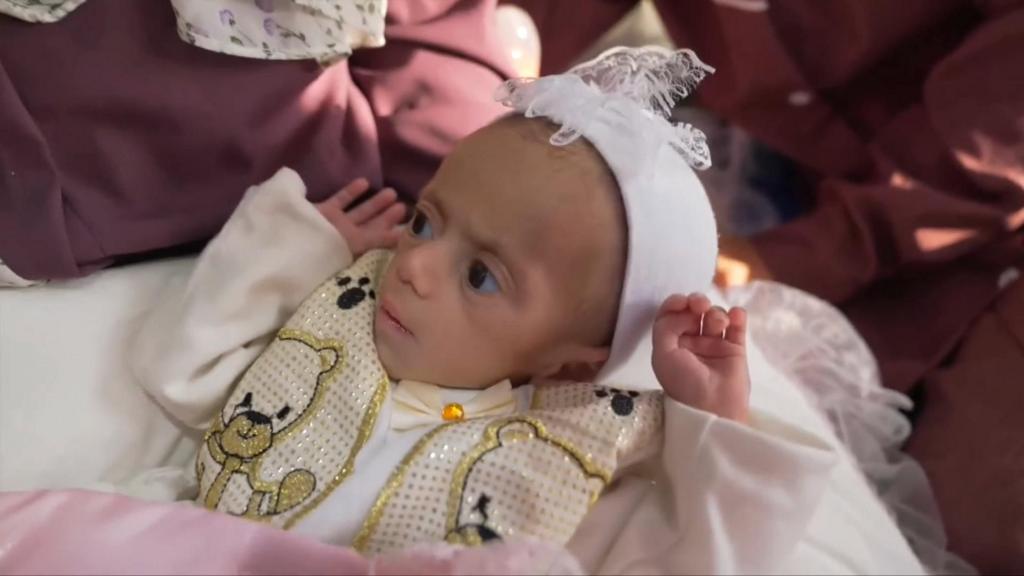Six-month-old Siwar Ashour’s faint cry was audible even before she was carried from the bus. It was the unwavering cry of a child born into war, now temporarily escaping its grasp.
Siwar, weighing only 3kg (6.6lb) – half her expected weight – is even smaller in person. Her mother, 23-year-old Najwa, smiled describing their arrival in Jordan on Wednesday, after Siwar’s evacuation from Gaza with other Palestinian children. The silence was the most striking aspect.
“It feels like a truce,” she explained. “With God’s will, we’ll spend the night without rockets and bombings.”
Siwar was accompanied by her grandmother, Reem, and her blind father, Saleh.
“Siwar is the sole reason for this journey,” Saleh stated. “We want her to reach safety and receive treatment. She’s my daughter, my blood, and I’m deeply worried about her.”
Reem carried Siwar from the bus onto Jordanian soil, forming a V for victory.
“I still can’t believe we’re in Jordan. Seeing King Abdullah’s photo at the border filled me with such joy, I made the victory sign… for Siwar.”
In April, as reported by the BBC, Siwar’s malnutrition at Nasser hospital in southern Gaza was attributed to a shortage of specialized infant formula. Her emaciation was severe; Najwa lacked sufficient breast milk due to her own malnutrition.
The Jordanian Field Hospital and private donors provided formula, but with the Israeli blockade (partially eased three weeks prior) and escalating conflict, Siwar required more comprehensive care.
A February agreement between King Abdullah and President Trump facilitated the transfer of 2000 seriously ill children to Amman. Gaza’s overwhelmed medical system struggles with the influx of sick and wounded. Since March, 57 children and 113 escorts have been evacuated; 16, including Siwar, arrived on Wednesday.
Cradled by her grandmother, Siwar gazed at the border’s unfamiliar crowd of police, medical personnel, and journalists.
In an air-conditioned hall, Jordanian medics provided food and drinks. Peace and abundance were evident.
The parents’ and children’s exhaustion was striking, representing a collective trauma. These families have endured displacement due to Israeli evacuation orders and food shortages. Many have lost loved ones or know those who have.
Conflict often separates families. Najwa took Siwar to the hospital, separating her from Saleh for two months.
“I thought it’d be a short treatment,” Saleh recalled, “but it dragged on… I realised her condition was serious.”
We accompanied Siwar and her family to Amman. Najwa slept soundly; Siwar remained awake. The ambulance carried two boys with cancer, their mothers, and two younger siblings – one constantly crying from exhaustion and fear.
In Amman, Siwar was transferred to a nurse, then another ambulance. She’ll receive crucial testing and treatment unavailable in Gaza. Her family will finally sleep without fear.
With additional reporting by Alice Doyard, Suha Kawar, Matthew Goddard and Malaak Hassouneh.
Their boat had been intercepted as they attempted to break Israel’s naval blockade on Gaza and deliver a symbolic amount of aid.
Asif William Rahman used top security clearance to print and circulate documents over several months.
At least 39 reportedly die in three incidents near lorries transporting flour and aid distribution sites.
The Columbia University graduate had a key role in student protests over Gaza. Trump said his arrest was the first of “many to come”.
One of the two hostages was Yair Yaakov, who was killed in the Hamas-led attack on 7 October 2023, Benjamin Netanyahu says.

